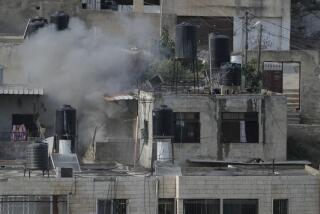Pakistanis seek answers after U.S. raid kills Osama Bin Laden
- Share via
Reporting from Islamabad, Pakistan — Pakistan Bin Laden: Pakistanis seek answers after U.S. raid kills Osama Bin Laden
Pakistan’s security establishment, already pummeled with questions about Osama bin Laden’s lengthy presence in the military city of Abbottabad, faces increasingly sharp scrutiny from another source: its own public.
Pakistanis accustomed to admiring the country’s vaunted military and spy agencies are uncharacteristically demanding details much like the rest of the world. How could the Pakistani intelligence community have remained unaware of where the leader of the Al Qaeda terrorist group lived, a city teeming with soldiers only about 40 miles north of the capital, Islamabad? Why didn’t Pakistani intelligence know about the raid to get Bin Laden or detect the U.S. helicopters in Pakistani airspace?
“A lot of people are raising their voices, and I think it’s only going to get worse,” said security analyst Talat Masood, a retired Pakistani general. “It’s going to be a very difficult task to satisfy the people of Pakistan as to what the military and intelligence agencies were doing. Were they complicit with Bin Laden, or simply ignorant of his presence in Abbottabad? In either case, the people need an explanation.”
In an editorial Wednesday, the English-language Dawn newspaper wrote, “Right under our military’s nose was found Osama bin Laden, the most wanted man of the decade, living in relative comfort in a compound with stringent security that somehow went unnoticed.”
Prime Minister Yousuf Raza Gilani, while in Paris on Wednesday to meet with French President Nicolas Sarkozy and business leaders, said “the whole world” and not just Pakistan shares responsibility for the intelligence failures that allowed Bin Laden to remain in Abbottabad for what the CIA says was five years.
Pakistani officials have denied knowing Bin Laden’s whereabouts and ordered an investigation into Pakistan’s inability to discover the hide-out. Both the civilian government and the country’s security bodies acknowledged that their failure to detect his presence for so many years was embarrassing.
A Pakistani intelligence official who spoke on condition of anonymity said Pakistani security forces carried out a raid on the compound while it was still under construction in 2003 in an attempt to capture Abu Faraj Libbi, a top Al Qaeda operative who had been hiding there. Libbi escaped, but in 2005 was captured by Pakistani security forces about 65 miles to the west in the city of Mardan. The timing of that purported raid in Abbottabad conflicts with aerial photos of the site taken in 2004 and released in the United States this week, which show a vacant tract.
The Pakistani government also says the country’s primary intelligence agency, the Inter-Services Intelligence directorate, had passed information about the compound to the CIA since 2009. It did not provide further details.
A U.S. official, speaking on condition of anonymity, said the Pakistani claim of supplying the U.S. information about the compound was not true.
Pakistan’s security establishment is not accustomed to criticism from a public that has held it in high esteem. Pakistanis credit the military with uprooting Taliban militants from the Swat Valley in 2009. And during last year’s catastrophic floods, survivors hailed the army for its rescue efforts and rapid delivery of aid, while reserving criticism for a government they said was exceedingly slow in responding to the crisis.
But this week, after Bin Laden’s killing in the raid by U.S. forces, Pakistani frustration with the security establishment was readily apparent.
Another English-language Pakistani daily, the News International, wrote in an editorial that “the intelligence failure that seems to have occurred must be discussed before the heat we could quite possibly face turns our way and leaves us scrambling for cover.”
Many Pakistanis upset by their intelligence community’s performance in failing to locate Bin Laden were also angered by their military’s failure to detect the pair of U.S. military helicopters involved in the 40-minute raid at his sprawling compound. CIA Director Leon E. Panetta told Time magazine in an interview that the CIA had ruled out informing Pakistan of the planned raid because of concerns that “they might alert the targets.”
Pakistan’s Foreign Ministry lashed out at the U.S. for carrying out the raid without first informing Islamabad. “Such actions,” the ministry said in a statement released this week, “undermine cooperation and may also constitute a threat to international peace and security.”
For Pakistani analysts and commentators, the raid unmasked glaring weaknesses in the military’s ability to defend its airspace.
Masood, the security analyst, said he was at a conference in the Pakistani city of Karachi this week where retired generals, senior journalists and politicians were extremely disappointed at the military’s failure to detect the helicopters’ incursion.
“The fact that the U.S. came deep into the country in the middle of the night and killed Bin Laden without Pakistan’s knowledge is very, very embarrassing,” Masood said. “People are just ashamed. The military that they had put their hopes on — look at their failures. Look at the failures of the intelligence community. Whom do [Pakistani citizens] have to look up to now?”
Times staff writer Ken Dilanian in Washington contributed to this report.
More to Read
Sign up for Essential California
The most important California stories and recommendations in your inbox every morning.
You may occasionally receive promotional content from the Los Angeles Times.













